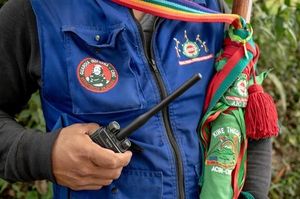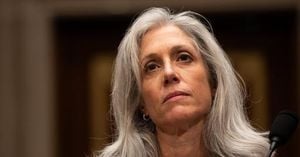On a misty Tuesday morning in the Scottish Borders, the quiet woodland near Jedburgh was anything but tranquil. Five sheriff officers, accompanied by four police officers, arrived at 8 a.m. to enforce a court-ordered eviction of the self-styled "Kingdom of Kubala"—a group that has stirred both local controversy and international intrigue. The removal, executed on September 16, 2025, followed a week-old warrant issued by Sheriff Peter Paterson at Jedburgh Sheriff Court, after the group ignored a prior eviction deadline.
The Kingdom of Kubala, as they call themselves, is led by 36-year-old Ghanaian Kofi Offeh, who styles himself King Atehene. Alongside him is his wife, Jean Gasho, 43, originally from Zimbabwe, who goes by Queen Nandi, and their companion Kaura Taylor, a Texan who calls herself Asnat, the handmaiden. The trio claims they are reclaiming land that was stolen from their ancestors some 400 years ago—a declaration that has captured the attention of more than 100,000 followers across TikTok and Facebook, and sparked headlines worldwide.
According to BBC Scotland, the eviction was a tense affair. The officers arrived at dawn, waking the group with their presence. Shouting echoed through the woods as tents were dismantled and possessions packed. Yet, the drama didn't end there. Within hours, the group had simply moved over a small wire fence, setting up a new camp just a few metres from their original site—still within sight of the authorities, but now on land later confirmed to be owned by the Scottish Borders Council.
Scott Hamilton, deputy leader of the Scottish Borders Council, explained the council's next steps: "We are assessing legally what the situation is in terms of their status. It does appear to be another person's land, but it may be in the council's ownership. We are working to establish that and then following that we will take forward legal action." By Tuesday afternoon, workmen had already erected a new fence around the area where the group had relocated, signaling the council's intent to prevent further unauthorized occupation.
The legal battle has been ongoing for months. The landowners, Mary and David Palmer, represented by lawyer Conner McConnell, brought a civil action for the "removal of occupiers on the basis of no right to title." The Palms had previously issued an eviction notice, requiring the group to vacate by 5 p.m. on September 8, 2025—a deadline that came and went without compliance. Sheriff Peter Paterson’s order, issued on September 12 and effective immediately, was the latest escalation in a saga that began earlier in the year, when the trio first arrived in Jedburgh and set up camp on a hillside above the town.
Despite repeated attempts by the council to engage with the group, cooperation was not forthcoming. Hamilton expressed his frustration, stating, "They have rebuffed every opportunity to engage with us. We can help them, but we won't sit back and let them break the law." He added that the landowner had been left with "no option" but to seek an order from the sheriff. The council’s position is clear: whatever the group’s claims to ancestral rights, occupying land without permission is against the law.
Yet, the Kingdom of Kubala shows no sign of backing down. In a defiant Facebook post, they declared, "nobody can stop Kubala" and "The Kingdom of Kubala can never be destroyed!" Their leader, Kofi Offeh, was equally resolute when speaking at the campsite. "The creator of the heavens and the Earth is the one with us. We are not afraid of whatever the court, the so-called court, has granted," he told Sky News. When pressed about their next move, Offeh replied, "If the creator of the heavens and the Earth wants us to move from this land, he shall find us a place to go."
The group's narrative is rooted in a claim of historical injustice. They insist that the land was stolen from their ancestors centuries ago, and that their presence is an act of reclamation. It’s a story that resonates with many online, fueling their rapid rise to social media prominence. Their online following has grown to over 100,000, and their posts have drawn worldwide media attention, transforming what might have been a local dispute into a global talking point.
But the local authorities remain unmoved by the group’s rhetoric. After confirming that the new campsite sits on council-owned land, the Scottish Borders Council wasted no time in submitting fresh paperwork to the court to begin another round of eviction proceedings. Hamilton reiterated, "We are working to establish that and then following that we will take forward legal action." The council’s approach is methodical, relying on the courts and law enforcement to resolve the matter, rather than direct confrontation.
The Kingdom of Kubala’s journey has already seen several relocations. After their initial eviction from the hillside above Jedburgh in July, the group moved about a mile further out of town to the woodland next to an industrial estate. Each time they are moved, they simply reappear nearby, undeterred by fences or legal warnings. Their determination, coupled with their online reach, has made them a symbol of resistance for some—and a legal headache for local authorities and landowners.
While the group’s claims of ancestral rights are not recognized by Scottish law, their persistence raises broader questions about land ownership, historical wrongs, and the power of social media to amplify fringe movements. For the council and the courts, the issue is a straightforward matter of property rights and the rule of law. For the Kingdom of Kubala and their followers, it is a struggle for recognition and justice—one that they show no sign of abandoning.
As the legal process grinds on, the woodland near Jedburgh remains a battleground not just of tents and fences, but of competing narratives about history, belonging, and the limits of protest. Whether the Kingdom of Kubala will find a permanent home—or simply move on again—remains to be seen. For now, the standoff continues, watched closely by locals, officials, and an ever-growing online audience.






